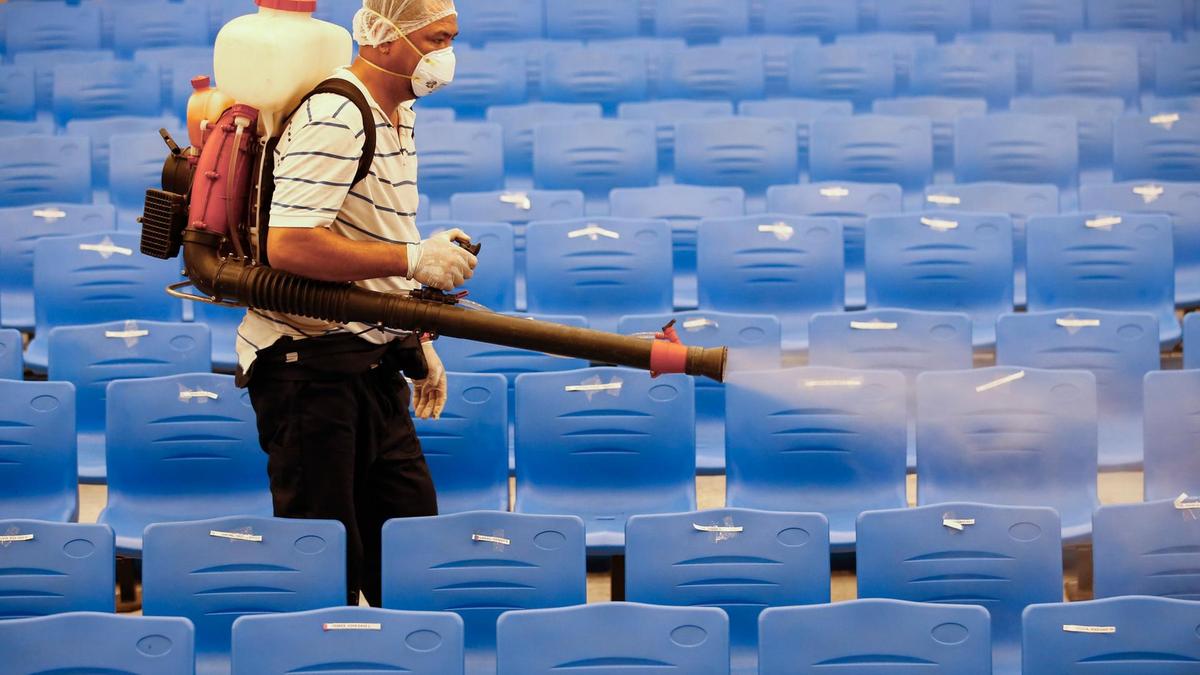Coronavirus is teaching us all how to be vulnerable together

A worker disinfects a auditorium after classes were suspended for sanitation operations in an elementary school in Cainta town of Rizal province, east of Manila. EPA
On Sunday, Italy, the eurozone’s third largest economy, locked down Milan and the industrial regions that serve as the country’s economic engine for a whole month. The day before, South by Southwest, the influential tech, film and music conference held every year in Austin, Texas, was cancelled. So was the London Book Fair, one of the publishing industry’s biggest annual international gatherings; the Geneva Motor Show, one of the largest automobile shows of the year; Barcelona’s Mobile World Congress and more than a hundred events at the European Parliament. The World Bank postponed its 2020 Fragility Forum; the US did the same with the Association of Southeast Asian Nations leaders’ meeting scheduled for March 14 in Las Vegas and the producers of the new James Bond film, No Time to Die, decided to delay its global rollout to November.
Whatever happens in the days ahead with Covid-19, the new strain of the large coronavirus family of viruses, it has already hit a milestone. Barely 10 weeks after China first alerted the World Health Organisation to several cases of unusual pneumonia in Wuhan, the flu-like disease now in 90 countries and territories has knit the world together in anxiety. Covid-19 has underlined an acute realisation of our shared vulnerabilities.
Markets are bracing for perhaps the greatest exogenous shock since 9/11
It comes at an extraordinary time. Politics in many parts of the world has already spoken against the globalisation of supply chains, cross-border flows and the 70-year-old multilateral architecture of the global village. For the past three years, US President Donald Trump’s administration has taken a uniquely dismissive view of global trade, to the point of even enfeebling the World Trade Organisation’s (WTO) dispute settlement system. This has prompted fears of a US-China economic decoupling, a wider trend towards de-globalisation and the end of the rules-based trading system underpinned by the WTO. Meanwhile, populist European politicians have thrown up rhetorical and policy barriers to the movement of people, goods and services.
But ‘America First’ restrictionism and anti-immigrant banners have been no protection against a microbe that does not respect national frontiers. If anything, the worldwide spread of a virus that probably originated in bats in a cave in far-off China and was subsequently transmitted to humans via an exotic endangered species of mammal underlines the stubborn reality of our interconnectedness.
The effects of the outbreak are being felt across almost every sector of economic, cultural, sporting and political activity in almost every part of the world.
Late last week, aerial photos released by the Colorado-based space technology firm Maxar showed that public spaces from Mecca to Beijing had all but emptied, with all that implies for travel and tourism. The International Air Transport Association (Iata) doubled its estimate of the impact on worldwide airline revenues to anywhere between $63 billion and $113 billion as people cancel plans to travel for work or leisure. Saudi Arabia announced that it would offer hefty discounts on crude in what is seen as an incipient oil price war six years after the last one. It was a response to falling demand even as Russia refused to join production cuts with Opec countries. China’s vice foreign minister Ma Zhaoxu admitted the virus would have a “temporary” impact on the country’s massive overseas construction and investment plans. From London came anecdotal reports that stores in the British capital were running out of supplies of hand soap. US 30-year fixed rate home mortgages hit their lowest point in nearly half-a-century with investors shifting money out of the stock market and into the safety of US Treasuries. Even Houzz, the hip home design and improvement online community, sent out an email from Palo Alto, California, warning about the “eight germiest places in your kitchen”.
All of these developments are having knock-on effects on the ecosystems they support. For instance, the precipitate fall in airport traffic means little or no business for related restaurants, stores, hotels, taxis and ride-sharing companies such as Uber, Lyft, Ola and Bolt, with all that implies for billions of workers in the gig economy. The cruise industry is in a crisis. The tourism industry’s declining fortunes is starting to affect television companies with the UK’s ITV warning that its ad sales would drop 10 per cent in April because travel companies had stopped spending on marketing. If ad spend falls, television companies may cut back on projects leaving producers, actors, scriptwriters, cameramen without adequate paid work.
The construction sector is also facing disruption as a result of delays to several of China’s Belt and Road projects, not least a high-speed rail line in Indonesia, another railway track that will link Malaysia to Wuhan, the massive land reclamation effort to expand Sri Lanka’s port capital Colombo as well as corporate initiatives in Pakistan. Add to that the fall in demand for building materials and fuel for the tankers that transport them across the seas, and markets are bracing for perhaps the greatest exogenous shock since 9/11.
It is clear the toll taken by this coronavirus goes much beyond the tragic 3,500 (and counting) deaths already recorded as a result of infection. More than Sars, which also emerged from China, or Mers, first reported in Saudi Arabia, Covid-19’s effect on markets and the normal business of modern life is indirect and is working its way through the organic linkages that girdle the earth. But while temporarily weakening physical links, digital ones are being strengthened. Companies that sell remote working technology such as Slack, Zoom, Teledoc and Dropbox are all having a good first quarter. So while it is not business as usual and probably will not be for a while, Covid-19 does at least show that the world will find a way to remain connected.
Originally published at https://www.thenational.ae

